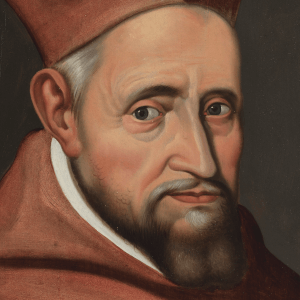
St. Robert Bellarmine was an Italian Jesuit Bishop and Doctor of the Church. He was instrumental in the Counter-Reformation of the Church against the Protestant heresies.
Read the full St Robert Bellarmine novena on the novena page. You can also learn more about novenas here.
Who Was Saint Robert Bellarmine?
St. Robert Bellarmine was an Italian Jesuit Bishop and Doctor of the Church. He was instrumental in the Counter-Reformation of the Church against the Protestant heresies. Pray this novena for canonists, canon lawyers, catechists, catechumens, and the Archdiocese of Cincinnati.
Roberto Francesco Romolo Bellarmino was born on October 4, 1542, in Montepulciano, Tuscany, to a noble but financially struggling family. His mother, Cinzia Cervini, was the sister of Pope Marcellus II, providing young Robert with connections to the highest levels of the Catholic Church. Despite his family’s noble status, they faced economic hardships that would shape Robert’s understanding of worldly concerns throughout his life. He demonstrated exceptional intellectual abilities from an early age, showing particular aptitude for languages, rhetoric, and theological studies.
At the age of eighteen, Bellarmine entered the newly formed Society of Jesus (Jesuits) in 1560, beginning a religious life that would define his career and legacy. He pursued his studies with remarkable dedication, mastering not only Latin and Greek but also Hebrew, which was unusual for his time. After completing his philosophical and theological education, he was ordained a priest in 1570. His superiors quickly recognized his exceptional talents as both a scholar and preacher, leading to his appointment as a professor at the University of Louvain in the Spanish Netherlands, where he lectured on theology and became renowned for his eloquent sermons and rigorous academic approach.
Bellarmine’s most significant intellectual contribution came through his monumental work Disputations on the Controversies of the Christian Faith, published between 1586 and 1593. This comprehensive defense of Catholic doctrine against Protestant theology became one of the most influential works of the Counter-Reformation. His writings addressed virtually every major theological controversy of his era, from papal authority and the sacraments to Scripture and tradition. The work was so thorough and well-argued that it was banned in several Protestant countries, while simultaneously being criticized by some Catholics for being too conciliatory toward Protestant positions on certain minor points.
In 1599, Pope Clement VIII appointed Bellarmine as a cardinal despite his personal reluctance to accept the position, as he preferred his scholarly work to ecclesiastical politics. As a cardinal, he played crucial roles in several significant Church matters, including the revision of the Vulgate Bible and involvement in the controversial Galileo affair. While he was more moderate than many of his contemporaries regarding Galileo’s astronomical theories, he still upheld the Church’s position that heliocentrism contradicted Scripture. Throughout his time as cardinal, he maintained his reputation for personal holiness, living simply despite his high rank and giving generously to the poor.
Bellarmine died on September 17, 1621, in Rome, having spent his final years in prayer, writing spiritual works, and continuing his charitable activities. His reputation for sanctity grew after his death, leading to his beatification in 1923 and canonization as a saint in 1930 by Pope Pius XI. In 1931, he was declared a Doctor of the Church, recognizing his outstanding contribution to Catholic theology and doctrine. St. Robert Bellarmine’s legacy endures not only through his theological writings, which remained influential for centuries, but also through his example of combining rigorous intellectual work with deep personal piety and pastoral concern for others.